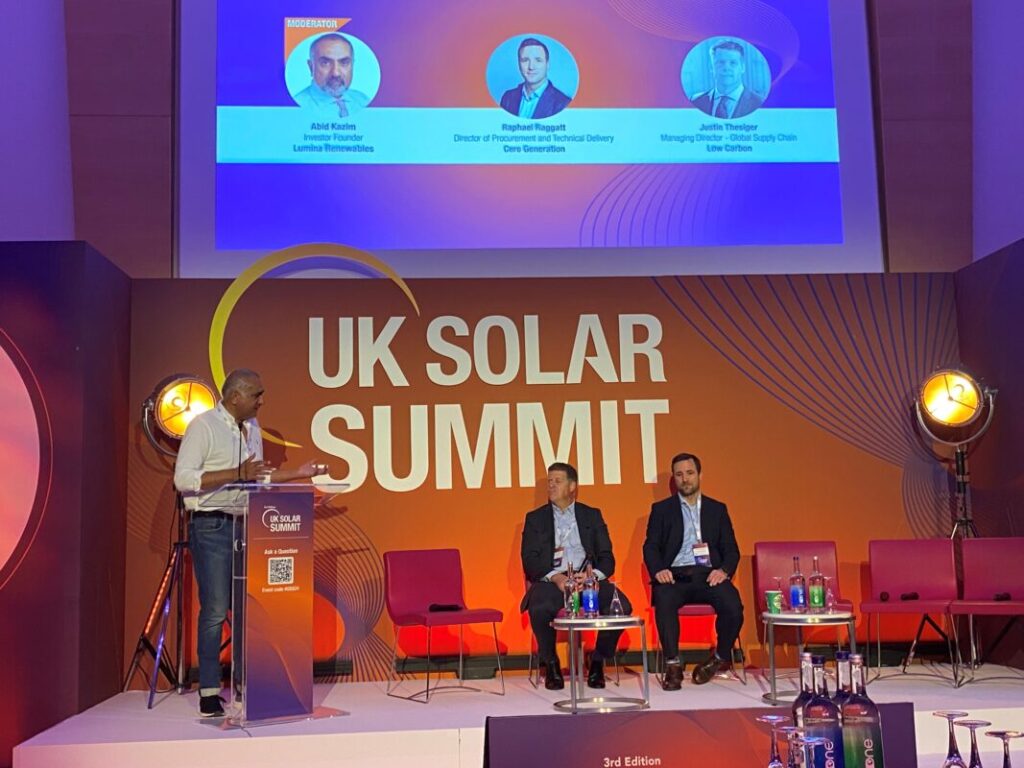
As the UK looks down the barrel of a massive expansion in solar capacity—70GW by 2035, currently—competition across the supply chain is increasing. In particular, the capacity expansions combined with the relative difficulty of attracting European engineering companies following the UK’s exit from the EU have created a significant labour shortage.
This is according to panellists at the opening session of day two of the UK Solar Summit in London, which discussed the future of the UK’s solar supply chain.
Justin Thesiger, managing director for global supply chain at Low Carbon, said, “It takes around 200 people—give or take—to build a 50MW PV plant. We’re talking 70GW by 2035…we don’t have the quantity of skills in this country to deliver the gigawatts that we need”
Raphael Raggatt, director of procurement at Cero Generation, agreed. He said that as the UK’s solar market is “gradually building up again over the past couple of years…we’re competing with projects all across Europe for the same labour. You had Spanish and Greek contractors that were active in the UK market before, but you’re competing for that resource for projects now being built in Spain, Italy, Greece and elsewhere. With all the challenges in the UK—visas and everything like that—if contractors can pick and choose markets, they’ll pick an EU market rather than here.”
Raggatt is referring to the knock-on effects of the UK’s exit from the European Union.
Later in the discussion, Thesiger said that Low Carbon tries to plan its UK operations with EPC companies already present in the UK. “We’ve gone out to non-UK registered EPCs, and some have turned us down, purely on the basis that they’ve said the bureaucracy, the red tape, the hassle of getting people into this country is too much, and they’ve just walked away.”
Added to this labour procurement problem, the UK solar industry is also in competition with other infrastructure developments like housing and rail expansions. For example, Labour leader Sir Keir Starmer announced a commitment to 1.5 million new homes if his party comes into power next month—this, the panelists said, would squeeze an already tight EPC market even harder.
Panel moderator Abid Kazim, investor founder of Lumina Renewables, added the concern of the nascent European Green Deal Industrial Plan which, when it begins to take full effect, will increase competition for EPC contractors even more.
A seller’s market
In light of the challenges that developers face securing labour and EPCs, Kazim said that UK solar has shifted from a “buyer’s to a seller’s market”.
Raggatt said, “You’ve got to put a lot more effort into the relationships with your contractors and with the supply chain generally now. Contractors are picking and choosing which projects they want to work on—you just need to develop that relationship. It’s like a marriage; you need to court your contractors for your supply chain.”
He said that the key to survival is a robust pipeline. “You can’t just hope to survive on two projects in a year—you need to have a pipeline going forward. It’s about making sure you can balance what’s being delivered vs. keeping your supply chain happy.”
Thesiger said that framework partnerships are increasingly important. “Give [your contractors] visibility of your pipeline, make sure you give them continuity of supply and work. Otherwise, they won’t be able to keep their subcontractors, and then they will not do your project.”
Manufacturing supply
For a brief stint, discussion turned to manufacturing and module supply. Reggatt said that the low average selling price of modules over the last 18 months has “saved the day…we’ve been riding that wave as it’s come down.”
Indeed, our sister site PV Tech has been charting the decline in solar module and component prices in its Price Watch articles.
He continued: “I really hope that there’s no move towards EU manufacturing or UK manufacturing. We should be grateful that China has built up this whole supply chain to feed the low-carbon economy. Let’s use it, let’s not fight it. We’ve got enough battles on our hands to meet our net zero targets.”
However, a number of industry figures have argued that an overreliance on Chinese solar modules jeopardises the West’s energy security as it increases its share of PV. Governments and trade associations in the US and EU have, to different extents, emphasised the importance of at least a reserve capacity of domestic solar products to shore up supply against possible political or practical supply disruption.

